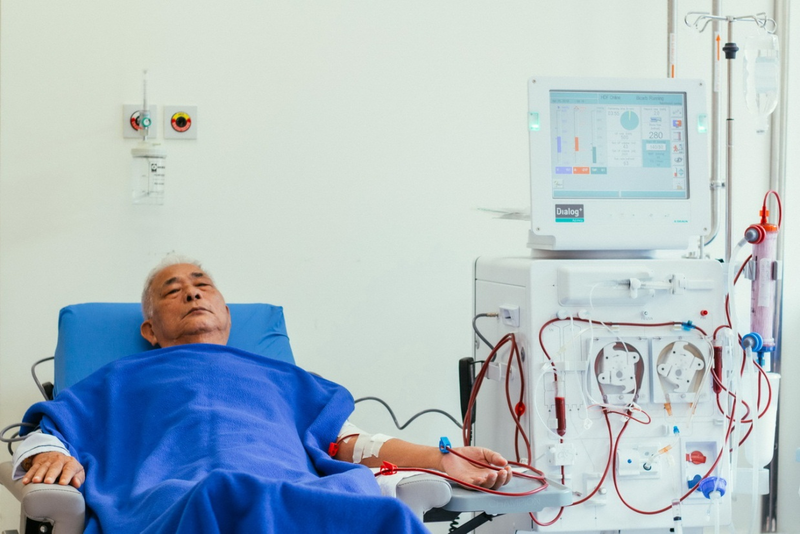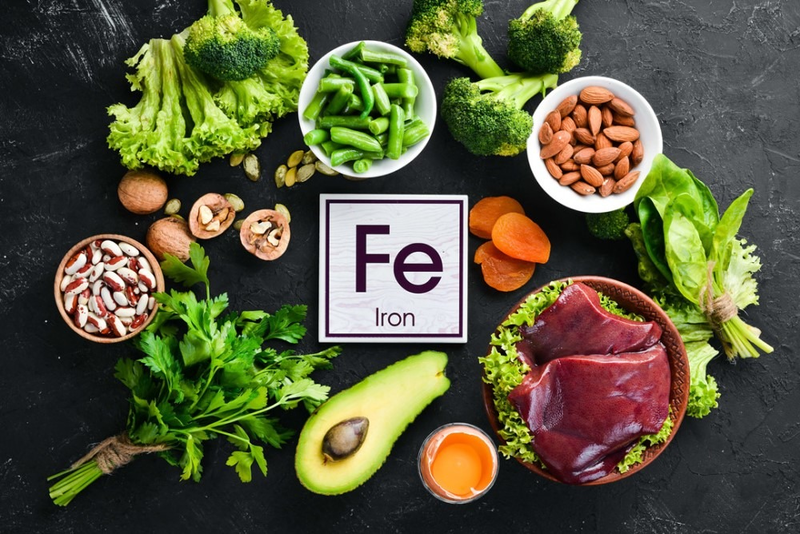1. Why are patients with kidney failure often anemic?
The kidneys are an important organ in the human body, where they filter wastes and excess fluids from the blood into the urine and out of the body. In addition, the hormone erythropoietin, which stimulates the body to produce red blood cells, is also produced here. This hormone is produced continuously, sending signals to stimulate bone marrow irrigation to produce red blood cells for the blood.

Patients with renal failure often have anemia
In patients with renal failure, erythropoietin production is also impaired, so the bone marrow does not receive the signal to produce red blood cells. When red blood cells are not produced enough, anemia occurs. This is the main cause of anemia in patients with renal failure, the degree of anemia will worsen as the progression of chronic kidney disease.
In addition, patients with renal failure often develop anemia due to other causes, including:
Absolute iron deficiency
Occurs due to blood loss, intestinal vascular dysplasia, bleeding due to high urea.
Relative iron deficiency
The body does not mobilize enough iron for the production of red blood cells.
Hemolysis
In addition, patients with chronic renal failure also suffer from hemolysis because red blood cells are low in iron, so they are easily broken and phagocytized, the red blood cell membrane is less likely to deform. Exposure to water pollutants such as zinc, arsenic, etc. can also lead to hemolysis.
Anemia due to diet and malabsorption
Patients with kidney failure need to control their diet strictly, especially to reduce protein in food daily. Besides, the disease symptoms also make patients tired, anorexia, poor absorption of nutrients. When the body does not receive enough blood-forming components including: iron, protein and folic acid, it will lead to poor blood production and cause anemia.
In addition, other factors that lead to anemia are:
- The patient has hematuria causing blood loss.
- The lifespan of red blood cells is short.
- Inflammation in the kidneys, heart, lungs, liver...
- Some hematological diseases such as myelosuppression, haemorrhagic thrombocytopenia, etc
- Patients with hypothyroidism and parathyroid glands.
- Use of drugs with hemolytic side effects.

Patients with kidney failure often require hemodialysis
2. Symptoms of anemia in patients with kidney failure are most recognizable
Anemia condition makes patients always feel no energy, no vitality, tired body, weak health, weak immune system and stamina, etc. Recognize by signs that may appear. Frequently includes:

Anemia causes shortness of breath, chest tightness
- Shortness of breath, chest tightness.
- Unstable heart rate.
- Pale skin, weak health, or minor illness.
- Difficulty concentrating and thinking about work.
- Or headache, dizziness, lightheadedness, especially when changing positions, standing up or sitting up suddenly.
- The patient has hair loss.
- Nails are not shiny, tongues have lost spines.
When patients with kidney failure have the above abnormal signs, they should soon go to the hospital for examination and red blood cell count blood tests for rapid results about this anemia. In addition, the patient may need other tests to determine the exact problem such as blood iron level test, hemoglobin measurement, etc.
Symptoms of anemia in patients with kidney failure, if left untreated, will become increasingly severe, leading to cardiovascular complications, heart failure, stroke and death.
3. How to treat anemia in patients with kidney failure?
Based on the causes leading to anemia in patients with renal failure above, treatment will be as follows:
3.1. Supplementation of erythropoietin
The deficiency of the hormone erythropoietin produced by the kidneys can be corrected by subcutaneous or intravenous doses. The dose of erythropoietin supplement is also based on the results of the Hb test, weight and clinical status of the patient.
Changes in Hb levels during treatment will help your doctor adjust the amount of erythropoietin supplementation accordingly.
3.2. Iron supplement
Iron supplementation has always played an important role in the treatment of anemia in patients with renal failure, both to help ensure blood supply to the body and to improve symptoms of disease such as thermoregulation, immune enhancement, and functional improvement. awareness, adaptation to sports practice, etc.

Iron supplements help improve anemia
Iron can be added to the body through the following preparations:
- Oral Iron: The supplement is less effective than intravenous iron but is easier to use and more affordable, so this product is still preferred.
- Intravenous iron: on the market, there are many types of supplements, such as iron dextran, iron sucrose, iron gluconate, etc.
3.3. Transfusion of red blood cells
This is a common and fast-acting measure to help with anemia. The doctor will order when the patient is anemic, acute blood loss or ESAS therapy is risky or ineffective.
However, in the case of kidney transplantation, it is not performed to avoid the risk of sensitization to the new kidney.
Thus, anemia in patients with kidney failure seriously affects the patient's health, increasing the risk of complications such as stroke, heart failure, death, etc. Therefore, treating anemia in patients with kidney failure is very important. Importantly, it is necessary to combine continuous monitoring and change treatment in accordance with the disease status.

Anemia complications in patients with renal failure can be fatal
It is necessary to detect early symptoms of anemia in patients with renal failure for diagnosis, prevention and treatment. Patients need to absolutely follow the doctor's treatment instructions, combine a full diet, and enhance nutrition to improve their condition.